| Listing 1 - 10 of 32 | << page >> |
Sort by
|
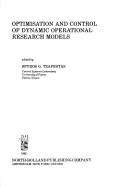
ISBN: 044486380X 9780444863805 Year: 1982 Volume: 4 Publisher: Amsterdam
Abstract | Keywords | Export | Availability | Bookmark
 Loading...
Loading...Choose an application
- Reference Manager
- EndNote
- RefWorks (Direct export to RefWorks)
Mathematical control systems --- Management --- Control theory --- Operations research --- Management science --- Mathematical models --- Control theory. --- Management science. --- Operations research. --- Mathematical models. --- Management - Mathematical models
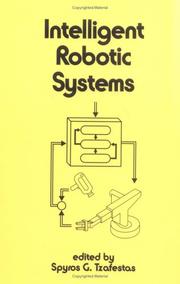
ISBN: 082478135X Year: 1991 Publisher: New York (N.Y.): Dekker
Abstract | Keywords | Export | Availability | Bookmark
 Loading...
Loading...Choose an application
- Reference Manager
- EndNote
- RefWorks (Direct export to RefWorks)
Robotics --- Robotique --- Automation --- Machine theory
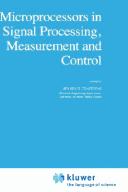
ISBN: 9027714975 9400970099 9400970072 Year: 1983 Publisher: Dordrecht Reidel
Abstract | Keywords | Export | Availability | Bookmark
 Loading...
Loading...Choose an application
- Reference Manager
- EndNote
- RefWorks (Direct export to RefWorks)
Microprocessoren --- 621.391 --- Digital control systems --- Microprocessors --- Signal processing --- -#KVIV --- Processing, Signal --- Information measurement --- Signal theory (Telecommunication) --- Minicomputers --- Automatic control --- Electronic digital computers --- General questions of electrical communication engineering. Cybernetics. Information theory. Signal theory --- Digital techniques --- Digital control systems. --- Microprocessors. --- Digital techniques. --- 621.391 General questions of electrical communication engineering. Cybernetics. Information theory. Signal theory --- #KVIV --- Digital signal processing --- Digital communications --- Digital electronics
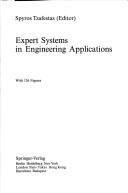
ISBN: 3540520457 3642840507 3642840485 Year: 1993 Publisher: Berlin Springer
Abstract | Keywords | Export | Availability | Bookmark
 Loading...
Loading...Choose an application
- Reference Manager
- EndNote
- RefWorks (Direct export to RefWorks)
Computer-aided engineering --- Expert systems (Computer science) --- -#KVIV:BB --- 681.3*I21 --- 681.3*J2 --- Knowledge-based systems (Computer science) --- Systems, Expert (Computer science) --- Artificial intelligence --- Computer systems --- Soft computing --- CAE --- Engineering --- Industrial applications --- Applications and expert systems (Artificial intelligence). Cartography. Games. Industrial automation. Law. Medicine and science. Natural language interfaces. Office automation--See also {681.3*H4}; {681.3*J} --- Physical sciences and engineering (Computer applications) --- Data processing --- Computer-aided engineering. --- Industrial applications. --- Expert systems (Computer science). --- 681.3*J2 Physical sciences and engineering (Computer applications) --- 681.3*I21 Applications and expert systems (Artificial intelligence). Cartography. Games. Industrial automation. Law. Medicine and science. Natural language interfaces. Office automation--See also {681.3*H4}; {681.3*J} --- #KVIV:BB
Book
ISBN: 0306430363 1489924736 148992471X Year: 1989 Publisher: New York (N.Y.): Plenum
Abstract | Keywords | Export | Availability | Bookmark
 Loading...
Loading...Choose an application
- Reference Manager
- EndNote
- RefWorks (Direct export to RefWorks)
Expert systems (Computer science) --- Fault location (Engineering) --- -Process control --- -#KVIV:BB --- 681.3*I24 --- Control of industrial processes --- Industrial process control --- Automatic control --- Manufacturing processes --- Quality control --- Location of system faults --- System fault location (Engineering) --- Dynamic testing --- Knowledge-based systems (Computer science) --- Systems, Expert (Computer science) --- Artificial intelligence --- Computer systems --- Soft computing --- Data processing --- Knowledge representation formalisms and methods: frames and scripts; predicate logic; relation systems; representation languages; procedural and rule-based representations; semantic networks (Artificial intelligence) --- Process control --- Data processing. --- Expert systems (Computer science). --- 681.3*I24 Knowledge representation formalisms and methods: frames and scripts; predicate logic; relation systems; representation languages; procedural and rule-based representations; semantic networks (Artificial intelligence) --- #KVIV:BB
Book
ISBN: 3319217135 3319217143 Year: 2016 Publisher: Cham : Springer International Publishing : Imprint: Springer,
Abstract | Keywords | Export | Availability | Bookmark
 Loading...
Loading...Choose an application
- Reference Manager
- EndNote
- RefWorks (Direct export to RefWorks)
This volume explores the ethical questions that arise in the development, creation and use of robots that are capable of semiautonomous or autonomous decision making and human-like action. It examines how ethical and moral theories can and must be applied to address the complex and critical issues of the application of these intelligent robots in society. Coverage first presents fundamental concepts and provides a general overview of ethics, artificial intelligence and robotics. Next, the book studies all principal ethical applications of robots, namely medical, assistive, socialized and war roboethics. It looks at such issues as robotic surgery, children-robot and elderly-robot therapeutical/social interactions and the use of robots, especially autonomous lethal ones, in warfare. In addition, a chapter also considers Japanese roboethics as well as key intercultural and robot legislation issues. Overall, readers are provided with a thorough investigation into the moral responsibility (if any) of autonomous robots when doing harm. This volume will serve as an ideal educational source in engineering and robotics courses as well as an introductory reference for researchers in the field.
Robotics -- Moral and ethical aspects. --- Technology -- Moral and ethical aspects. --- Mechanical Engineering --- Engineering & Applied Sciences --- Mechanical Engineering - General --- Robotics --- Technology --- Moral and ethical aspects. --- Technology and ethics --- Automation --- Machine theory --- Ethics. --- Artificial intelligence. --- Philosophy. --- Control, Robotics, Mechatronics. --- Artificial Intelligence. --- Philosophy of Technology. --- Mental philosophy --- Humanities --- AI (Artificial intelligence) --- Artificial thinking --- Electronic brains --- Intellectronics --- Intelligence, Artificial --- Intelligent machines --- Machine intelligence --- Thinking, Artificial --- Bionics --- Cognitive science --- Digital computer simulation --- Electronic data processing --- Logic machines --- Self-organizing systems --- Simulation methods --- Fifth generation computers --- Neural computers --- Deontology --- Ethics, Primitive --- Ethology --- Moral philosophy --- Morality --- Morals --- Philosophy, Moral --- Science, Moral --- Philosophy --- Values --- Control engineering. --- Robotics. --- Mechatronics. --- Mechanical engineering --- Microelectronics --- Microelectromechanical systems --- Control engineering --- Control equipment --- Control theory --- Engineering instruments --- Programmable controllers
Book
ISBN: 3319669990 3319669982 Year: 2018 Publisher: Cham : Springer International Publishing : Imprint: Springer,
Abstract | Keywords | Export | Availability | Bookmark
 Loading...
Loading...Choose an application
- Reference Manager
- EndNote
- RefWorks (Direct export to RefWorks)
This unique book offers a comprehensive and integrated introduction to the five fundamental elements of life and society: energy, information, feedback, adaptation, and self-organization. It is divided into two parts. Part I is concerned with energy (definition, history, energy types, energy sources, environmental impact); thermodynamics (laws, entropy definitions, energy, branches of thermodynamics, entropy interpretations, arrow of time); information (communication and transmission, modulation–demodulation, coding–decoding, information theory, information technology, information science, information systems); feedback control (history, classical methodologies, modern methodologies); adaptation (definition, mechanisms, measurement, complex adaptive systems, complexity, emergence); and self-organization (definitions/opinions, self-organized criticality, cybernetics, self-organization in complex adaptive systems, examples in nature). In turn, Part II studies the roles, impacts, and applications of the five above-mentioned elements in life and society, namely energy (biochemical energy pathways, energy flows through food chains, evolution of energy resources, energy and economy); information (information in biology, biocomputation, information technology in office automation, power generation/distribution, manufacturing, business, transportation), feedback (temperature, water, sugar and hydrogen ion regulation, autocatalysis, biological modeling, control of hard/technological and soft/managerial systems), adaptation and self-organization (ecosystems, climate change, stock market, knowledge management, man-made self-organized controllers, traffic lights control).
Science --- Science and society --- Sociology of science --- Social aspects. --- Engineering. --- Energy. --- Bioinformatics. --- Complexity, Computational. --- Control engineering. --- Electrical engineering. --- Control. --- Data-driven Science, Modeling and Theory Building. --- Complexity. --- Energy, general. --- Communications Engineering, Networks. --- Telecommunication. --- Control and Systems Theory. --- Bio-informatics --- Biological informatics --- Biology --- Information science --- Computational biology --- Systems biology --- Electric communication --- Mass communication --- Telecom --- Telecommunication industry --- Telecommunications --- Communication --- Information theory --- Telecommuting --- Construction --- Industrial arts --- Technology --- Data processing --- Sociophysics. --- Econophysics. --- Computational complexity. --- Electric engineering --- Engineering --- Complexity, Computational --- Electronic data processing --- Machine theory --- Economics --- Statistical physics --- Mathematical sociology --- Control engineering --- Control equipment --- Control theory --- Engineering instruments --- Automation --- Programmable controllers --- Statistical methods
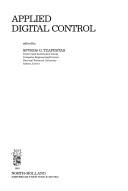
ISBN: 0444878823 Year: 1985 Publisher: Amsterdam : North-Holland,
Abstract | Keywords | Export | Availability | Bookmark
 Loading...
Loading...Choose an application
- Reference Manager
- EndNote
- RefWorks (Direct export to RefWorks)

ISBN: 0792307801 Year: 1991 Publisher: Dordrecht : Kluwer,
Abstract | Keywords | Export | Availability | Bookmark
 Loading...
Loading...Choose an application
- Reference Manager
- EndNote
- RefWorks (Direct export to RefWorks)
Computer integrated manufacturing systems. --- Microprocessors. --- Robots --- Control systems.

ISBN: 0792315006 Year: 1991 Publisher: Dordrecht : Kluwer,
Abstract | Keywords | Export | Availability | Bookmark
 Loading...
Loading...Choose an application
- Reference Manager
- EndNote
- RefWorks (Direct export to RefWorks)
Artificial intelligence --- Expert systems (Computer science) --- Intelligent control systems --- Congresses. --- Congresses. --- Congresses.
| Listing 1 - 10 of 32 | << page >> |
Sort by
|

 Search
Search Feedback
Feedback About UniCat
About UniCat  Help
Help News
News